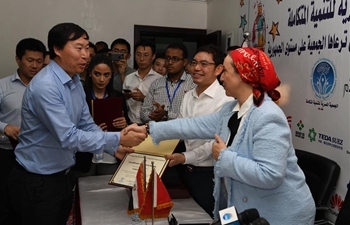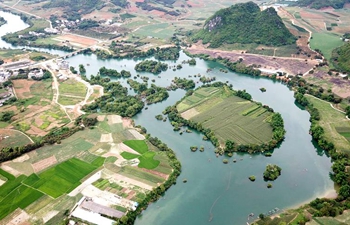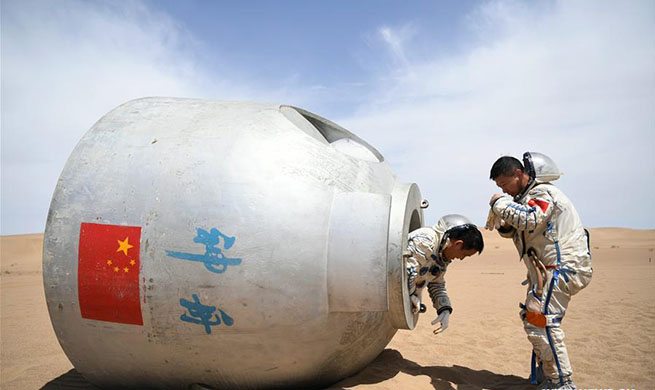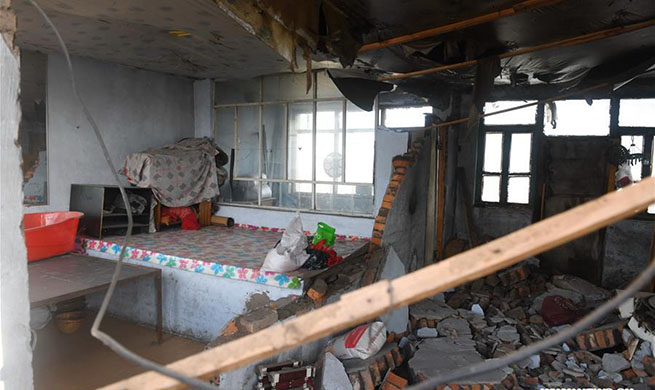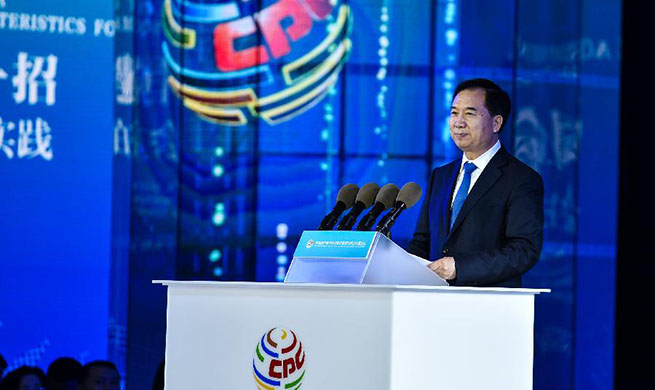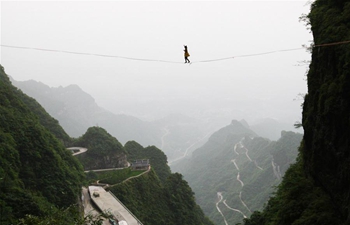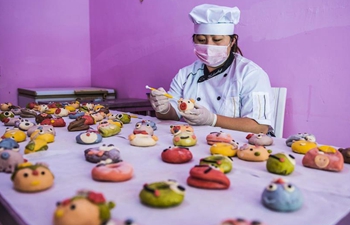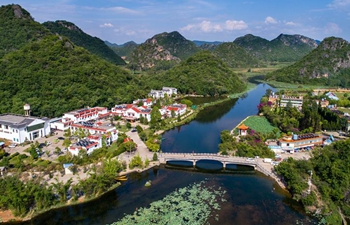by Olatunji Saliu
ABUJA, May 27 (Xinhua) -- Osman Sillah, a Sierra Leonean national, relocated to Nigeria two years ago with a mission to learn more about football development in the country.
However, his plan changed after he observed that there were huge investment opportunities in the country's football business.
Within one week in Nigeria, Sillah, a football agent certified by FIFA and the Confederation of African Football (CAF), realized that football was more than just a game in the country.
THE 'RELIGION'
"Football is a religion here, with many followers. It also unifies Nigerians," he told Xinhua.
Football is in the class of religion because of the love, and devotion that millions of Nigerians accord it, Sillah noted.
For many Nigerian citizens, football is more than a passion. It is also a money-spinning venture for investors, too.
Football in the country is regarded as that unifying factor that cuts across religion, tribe, and social differences. It is a national sport that helps to take the youth away from crimes and criminality.
From rural Nigeria to the urban centers, it is not uncommon to find teenage boys playing "street football" just like many other countries in Africa.
Some of these boys, mainly from poor homes, have dreams to make it big in life through football and help their families out of poverty.
For three months, Sillah said he began scouting for such local football talents and helping them get transfer deals in Europe where he has strong connections. His strategy worked for him.
"I got more than 130,000 U.S. dollars (47,000,000 naira) from two transfer deals within two months of establishing a football club and an academy here in Nigeria. And that's how my success story began," he said.
Oya Football Club, established by Sillah in 2016, is currently one of two teams in the race for the championship of the local amateur football league in Nigeria this season.
In the past two years, the grassroots football club has helped many Nigerian youths gain admission into the country's national football teams.
"We have a very wide scouting unit here where we get good players across Nigeria. Also, we have trained footballers from the West Africa region, including Ghana, Sierra Leone, Cote d'Ivoire and Senegal, to mention a few," he said.
The football club, with a base in Suleja, a city in central Nigeria, about 50 kilometers from the Nigerian capital, currently has a total of 60 amateur players.
It is one of the success stories of football in Nigeria, which is currently among the top six teams in Africa, according to FIFA's rankings in the month of May.
"We have 35 players in the senior team and 25 players with the feeders team, which is the academy team," he said.
AIMING FOR MEGABUCKS
Every year, Sillah sells the football talents under his management to big teams in Europe.
Many poor families now encourage their sons to get involved, mainly with the aim of getting transfer deals abroad and making enough money to cater to the rest of the family.
John Obi Mikel, Nigerian professional footballer who plays as a midfielder for Chinese club Tianjin Teda in the Chinese Super League and the captain of the Nigerian national team, is an example of such football players who rose from the cradle to stardom in the country.
Starting his official football career at the age of 12 when picked as a talented footballer from over 3,000 young talents to play in a local academy known for traveling across Nigeria scouting young footballers with the potential to play professionally, Mikel stood out to scouts and was later picked to play for top-flight club Plateau United, a side that had previously developed local stars including 1996 Olympic gold medalist Celestine Babayaro, among others, that went on to success in European leagues.
Mikel rose to fame at the 2003 FIFA Under-17 World Championships held in Finland. Following the tournament, he went on to a trial at South Africa club Ajax Cape Town, ultimately joining Oslo-based club Lyn Fotball in Norway.
Mikel, who also played for Chelsea Football Club in England for more than a decade before proceeding to China, will lead the Nigerian national team, the Super Eagles, to the FIFA World Cup in Russia in June.
There are many Nigerian stars of today and the past whose limelight stories are similar to that of Mikel.
"I've transferred about 30 players to clubs in Europe in the past two years," Sillah told Xinhua, naming some of Nigeria's big players as beneficiaries of his international transfer deals.
Parents or guardians now willfully take their wards to grassroots football clubs in Nigeria for nurturing, realizing that opportunities abound for them to play in big clubs abroad, including China.
"We encourage the players to get them focused on their future and we also use football to take them away from drugs and crime.
"Our intention in the club is to move the players to overseas where they can ply their trade in bigger clubs. We have a lot of big clubs in Europe who are affiliated with us," Sillah explained.
Despite being greenhorns, international clubs often hire local agents such as Sillah to regularly help them scout for younger talents for their academies or feeders' team. And that is where the megabucks come from.
Most times, it is a win-win situation for the players and their agents who earn big from such regular transfer deals.
"I have contacts in Finland, Belgium, Turkey, Estonia, Macedonia and in most of the Eastern Europe countries where I send my players to join clubs there," Sillah said.
Sparingly funded by the local government, grassroots football in Nigeria sometimes suffers a huge setback without corporate sponsors.
Yet, for private investors like Sillah, grassroots football is like a goldmine. It is the cradle of the football stars.
Most of the grassroots football clubs are solely sponsored by private owners. Only a few of them are government-owned.
The Oya Football Club is one of such football academies in Nigeria, Africa's most populous country, which depends mainly on proceeds from the sale of one talent to nurture another.
Many Africans have migrated to Nigeria where football "is a way of life" to seek the opportunity to attract foreign clubs to their talents.
Ivorian Banban Nuhu who is under the management of the Oya Football Club in Nigeria said he chose to make a living from football because he wants to be able to take care of his poor family back home in Cote d'Ivoire.
"There are no opportunities in my country. I am here (in Nigeria) because the grassroots football clubs here are well structured," Nuhu told Xinhua.
"Most of my friends that have come to play in Nigeria have found their ways to European clubs, that is why I chose to come so that I can have the opportunity to get trained and can go to Europe. It is easier for me to move to Europe to play football from Nigeria," said Nuhu.
After crossing to Europe to play, Nuhu said his objective is to educate himself with the proceeds from playing football.
"My dream is to earn a living from my football, so I can help myself and my family as well as help the less privileged like me, and also orphans, to encourage them to lead a better life," he added.
GRASSROOTS FOOTBALL IN NIGERIA
Nigeria has produced some of the best football legends in Africa, with big stars like Kanu Nwankwo and Austin JayJay Okocha on the honors' list.
Most of them started by playing in the Nigerian Nationwide League, the country's non-professional league, before graduating to the big stage.
Currently, there are over 250 football clubs playing in the amateur football league in Nigeria. Whereas, there are thousands of grassroots football clubs existing in the country but not well-known.
Most of the footballers in the nationwide league are mainly picked from the streets and given the training they require to hone their skills.
"We try to make them know the norms of the game and prepare them for the professional league," said Olusola Ogunnowo, the chief operating officer of the Nigerian Nationwide League.
Ogunnowo told Xinhua that all the players from the amateur league are fully covered and insured in the case of any serious accidents or injuries.
"Before a player is approved to play in the league, they are taken through the Precompetition Medical Assessment (PCMA) as recommended by FIFA to given them a clean bill of health which is constantly audited by a FIFA-accredited medical team working with us," he said.
Every Nigerian state has a sports council that ensures that facilities are available for use by the players.
Private clubs with wealthy sponsors also have their own facilities for their teams to get an edge in the national tournaments and leagues.
Nigeria is one of the FIFA member-states that are beneficiaries of the FIFA Goal Project, an incentive that FIFA gives to its member-states to help their grassroots football to develop.
It is well-equipped for technical development of football at the grassroots.
FUNDING OF GRASSROOTS FOOTBALL STILL A MAJOR CHALLENGE
Despite growing interest in football in Nigeria, funding is still a major issue.
Ogunnowo said he regretted that it has been very difficult to secure sponsors' confidence in the game that's known for bringing excitement to many Nigerians.
"The local leagues need investors to improve. There are still hundreds of future soccer stars still waiting to be discovered," he said.
Fathia Olayinka, the chief executive officer of the local Aroma Football Club in the southwestern state of Ogun, said his football club, too, has solely depended on the profits generated from the sale of players to run its day-to-day activities.
"Sourcing for funds for our football clubs is a huge task. And this is a general challenge for all of us who are private owners," Olayinka said, adding the future of football development in Nigeria resides in the private ownership of clubs because "the government will find it too challenging if they do not get returns on time."
Johnson Babatayo, another local club manager, urged the government to do more in funding football at the grassroots level and not just provide the facilities for training alone. Enditem






